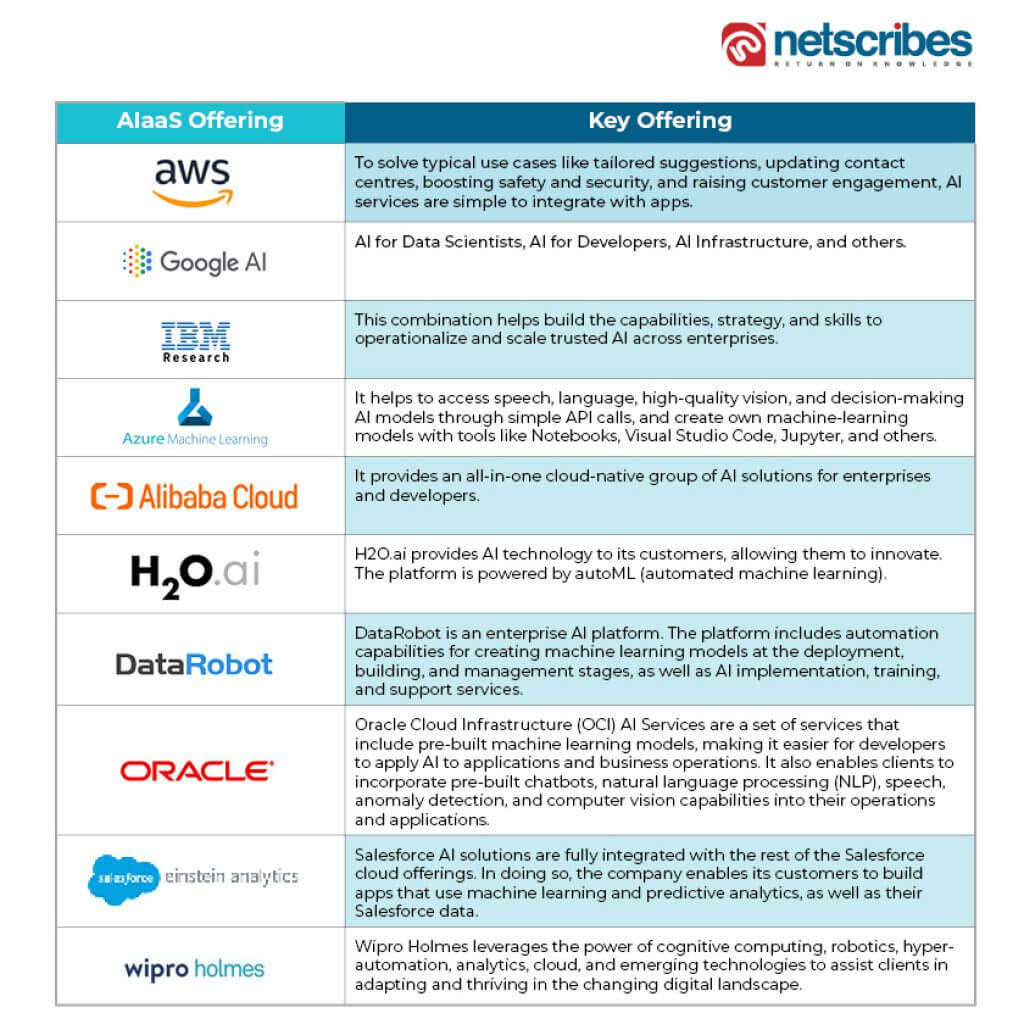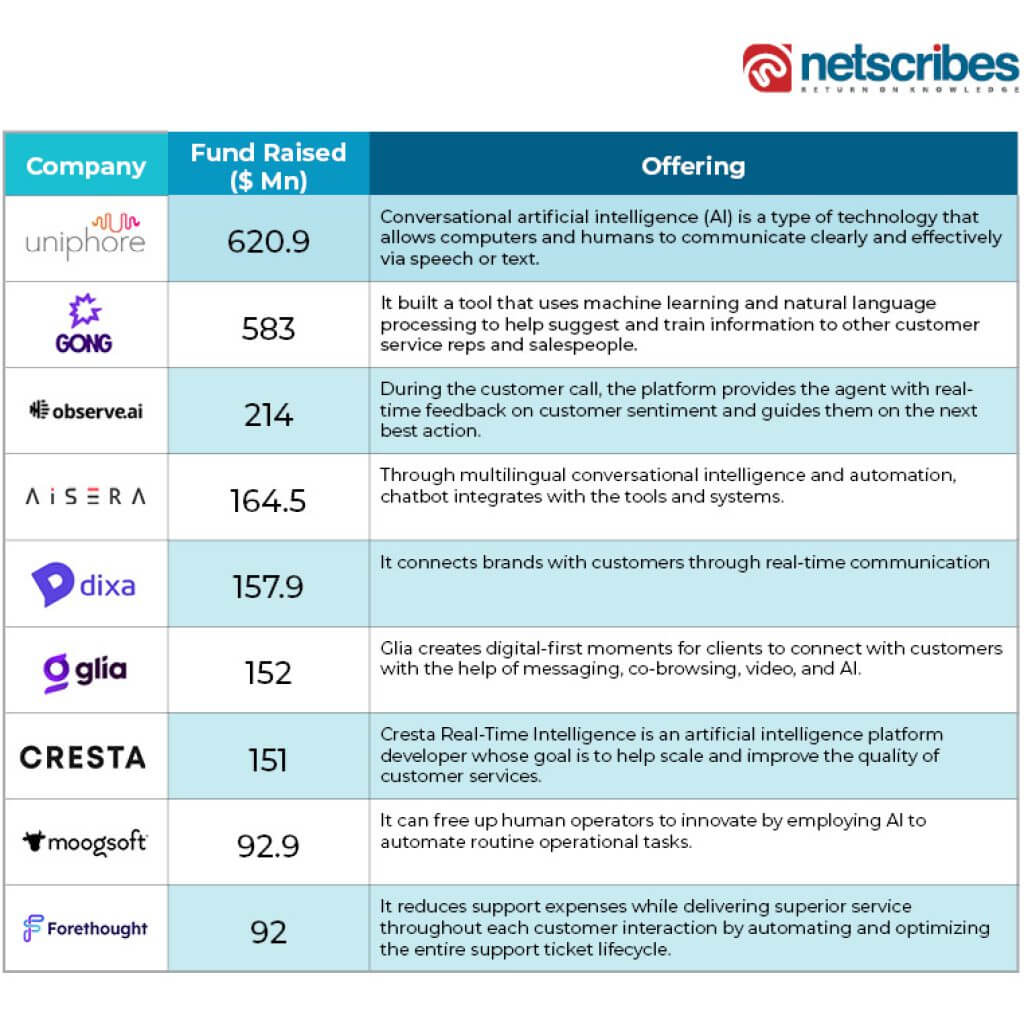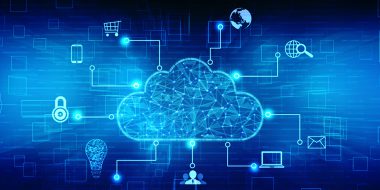AI is a broad term that encompasses a variety of technologies such as robotics, natural language processing (NLP), machine learning (ML), and computer vision. Many businesses are using AI to automate operations, make data-driven decisions, and improve products and consumer experiences. AIaaS or AI-as-a-Service, refers to businesses that offer advanced AI functionalities to companies in exchange for a one-time payment or monthly charge or on a subscription basis. AIaaS is a substitute for businesses that are unable to create their own clouds and develop, test, and employ their own AI systems. What draws people in the most is the opportunity to capitalize on data insights without making a substantial initial investment in skills and resources.
Cloud services enable businesses to purchase AI software and services from third-party vendors on a pay-as-you-go basis. Companies can now obtain tailored solutions based on their requirements. Organizations, particularly start-ups and small and medium-sized enterprises (SMEs), are looking for cost-effective AI solutions that do not require a large investment. Companies that use cloud services can gain access to AI resources and tailor them to their specific business needs. For example, if a company only requires a chatbot, one can customize the bot to meet their specific requirements.
Key big tech AIaaS companies
Many companies are launching cloud services to support AI solutions. Below tech giants are leading the market by offering ML and AI via their popular cloud platforms, allowing businesses to incorporate AI into systems and applications without incurring the cost of in-house development. Among the top AIaaS providers are:

Current use cases of AIaaS
- Cognitive computing APIs: An API (Application Programming Interface) behaves like an intermediary that allows two pieces of software to interact. APIs allow services to communicate with one another. APIs enable developers to incorporate a specific technology or service into their application without having to write the code from scratch. Common API options include NLP, computer speech and computer vision, translation, knowledge mapping, search, emotion detection, and others.
- Digital support and Chatbots (Automation and Digital Assistance): Chatbots that use natural language processing (NLP) algorithms to learn from human conversations and imitate language patterns. Bots are already transforming customer service by lowering first-time response rates and increasing customer satisfaction. They assist businesses in automating routine tasks, allowing agents to focus on more complex tasks. They can also provide real-time 24/7 assistance and handle multiple queries without the assistance of a human.
- Machine learning frameworks: ML and AI frameworks are tools that allow developers to create their own model that learns from existing company data over time. Machine Learning is a subset of AI that enables AI machines to learn from data and perform appropriately even when they are not programmed. In short, AI allows machines to think like humans, whereas machine learning provides data for machines to learn from. The potential of ML, on the other hand, can be utilized based on the quality solution, which is entirely dependent on the Machine Learning Development Services you have hired.
Benefits of using AIaaS for enterprises
- No requirement for advanced engineering skills: Companies using AIaaS generally do not require any coding or technical knowledge at any point during the setup process.
- Infrastructure that is both advanced and quick: Prior to AIaaS, powerful and fast GPUs were required for successful AI and machine learning models. Most SMEs lack the resources and time required to develop software in-house. There are a few general rules in the field of AI, one of which is that your model will only work well if it is fed high-quality data. Because AIaaS is customizable, it will allow enterprises to design a specific task-oriented model on top of the vast amounts of data they already have.
- Transparency: AIaaS provides the not only access to AI while reducing non-value-added labor, but also a high level of transparency. Machine learning necessitates a significant amount of computational power, but most pricing models focus on utilization.
- Usability: most as-a-service platforms are not user-friendly. Although many AI alternatives are open source, which means they can be freely downloaded, modified, and used, they can be challenging to set up and develop. In most cases, AIaaS, on the other hand, is completely ready to use. Process owners can use AI software without any formal training.
Related reading: AI in digital commerce: 10 use cases
Increased demand for AIaaS in recent years
Many government organizations, particularly in emerging economies, recognize the benefits and power of AI, and as a result, they are heavily promoting AI-based infrastructure development. In India, for example, Niti Aayog launched a national AI program, including R&D, with increased funding for Digital India to promote AI, machine learning, 3D printing, and other technologies.
The fact that 44% of businesses are working to integrate AI into existing apps and processes gives support to the argument that accessibility is critical. The rising trend of multi-cloud operation, as well as the growing demand for cloud-based intelligence services, are driving up demand for AIaaS. ~98% of organizations plan to include multi-cloud architectures. This opens a huge market for AIaaS in near future.
Artificial Intelligence startups and their funding
From medicine to sales to software development, artificial intelligence has the potential to transform industries. As remote work and reliance on technology become the new daily norm, AI has become essential for an increasing number of businesses. Below is the list of AI start-ups with a wide range of use cases among different industries.

Are there any AIaaS frameworks available for free?
There are many open-source AIaaS frameworks available in the market. A few of them are listed below:
- TensorFlow: TensorFlow is an open-source artificial intelligence program for developing and training machine learning models. It introduces a high-speed numerical computing library. Because of its modular architecture, this free AI software allows for simple compute deployment across a variety of platforms (CPUs, GPUs, and TPUs).
- IBM Watson: IBM Watson is a free as well as paid, open-source AI platform that enables businesses to accelerate R&D, predict disruptions, and improve interactions. Several businesses use this software to analyze data, collect the intellectual property, gain insights, and predict future performance. By utilizing IBM’s cloud-based platform, businesses may be able to make better decisions.
- Apache Mahout: Apache Mahout is a distributed framework for efficiently handling data processing. In conjunction with Hadoop, this free AI tool can be used effectively for data mining. This data mining software is used by many large companies, including Facebook, Foursquare, Twitter, LinkedIn, and Yahoo.
- OpenNN: OpenNN is a free and open-source artificial intelligence program written in C++. It increases processing speed. This program functions as a free neural network library for advanced analytics. This app ranks near the bottom of numerous apps in the energy, health, and marketing categories.
- Scikit-learn: Scikit-learn is a free artificial intelligence application that offers a consistent user interface for a variety of supervised and unsupervised learning techniques. It is regarded as a straightforward and efficient data mining and data analysis tool. This open-source AI program can be reused and applied in a variety of scenarios. This tool is worth considering if you want to incorporate machine learning into a production system.
Various AIaaS providers offer a variety of machine learning and AI styles. Because organizations must evaluate features and pricing to see what works best for them, these variations can be suited to an organization’s AI needs. AIaaS can provide specialized hardware for some AI tasks, such as GPU-based processing for heavy workloads. Purchasing the necessary hardware and software to start on-premises cloud AI is expensive. AI cloud offerings such as Amazon Machine Learning, Microsoft Cognitive Services, and Google Cloud Machine Learning can assist organizations in learning what their data might be capable of. Having the ability to test different providers’ algorithms and services allows businesses to determine what allows and works for scaling before committing.
Netscribes’ automation and AI solutions are designed to help clients navigate such new realities by transforming business operations and aligning teams to focus on what really matters: long-term business growth. It provides an intelligent solution for accelerating, processing, and reducing customer wait times through features such as web application modernization, custom AI development, automated data collection, data labeling, annotation, and many others.
It also provides services such as offline/legacy process digitization and automation, application development and maintenance, customized marketing tool development, and e-commerce store application development, among others. To know more about how we can help your business optimize processes to maximize productivity and ROI using AI-as-a-Service, contact us.
Based on insights by Husen Limdiwala – Manager, Market Research team, Netscribes






